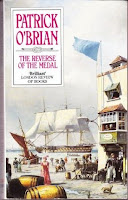Again, insomnia and being a part-time worker combine to lead to a healthy shelf-full of reading this month.
Patrick O'Brian, The Reverse of the Medal
Several thread come together in this (the eleventh) installment of the Aubrey-Maturin series. The influencial (and traitorous) men with a grudge against Aubrey finally bring their campaign against him to a head. He is duped into being the pasty for a stock market buble, which leads to his trial and dismissal from the Navy (as in much of the series, O'Brian is borrowing from history here, leaning on the trial of Lord Cochrane).
Raymond E Feist, MagicianAs a palette-cleanser from all this naval derring-do, I've embarked upon another shelf-groaning series, perhaps unwisely.
I've never read any Feist before, and this series (the Riftwars) was recommended as a different take from Vancian magic (I've never read any Vance either, but that's for another time...)
Good competent stuff. Even reading this first novel, I can see that George R R Martin and Joe Abercrombie have both been influenced by it. I still prefer Abercrombie, but that's just me.
Jonathan Morris, Festival of Death
 Patrick O'Brian, The Letter of Marque
Patrick O'Brian, The Letter of Marque
Aubrey, ejected from the Service that has been his life, is in a low place. Luckily, Maturin has come into a fortune and is this able to buy HMS Surprise - also retired from service - and set her up as a privateer. Plans are put on foot to find a Spectacular Action that will justify Aubrey's re-instatement.
Maturin has to deal with his complicated private affairs.
Ted Nield, Underlands: A Journey Through Britain's Lost LandscapeA geologist muses on the hundreds of thousands of holes - clay pits, gravel pits, quarries and mines - that used to scatter the landscape providing local (often very local) building materials and resources.
He uses these holes to tell two stories. On a human scale, he tells us of the generations of his family which lived and worked on the South Wales coalfield. On a geological scale, he walks us through what science learnt from them and tells that their filling-in or amenitisation will hinder geological education.
Finally, he ponders what it means that we now find it more economical (because of low wages, poor safety standards and under-priced petroleum) to import these earth resources from Asia, and what impact that will have on our planet. He makes a telling parallel between the unthinking siting of spoil-tips above the village of Aberfan and our persistant burning of fossilised carbon despite the lessons of geological history about its perils.
Aubrey and Maturin's mission to ferment revolution in South America is blown, so they are given another reason to be in the Pacific - to escort an envoy to negotiate a treaty with a Malay Sultan who's also being courted by the French. On the bright side, that means that Aubrey is re-instated to the Navy List and they get to give a couple of old enimies thier comeuppance.
Maturin meets an orangutan.
This is apparently one of the best Doctor Who novels - when eleven books were selected to be reissued as part of the 50th Anniversary celebrations, this was the one chosen to represent the Third Doctor. Despite this, I'd characterise it as 'for fans only' - but then, perhaps that's the point...
Our crew manage to escape the island on which they were cast away at the end of the last book (not without incident, of course) and make their way to Java, where Governor Raffles treats them well. They then go on to the Botany Bay Colony, which is a different story entirely - a squalidf, corrupt and brutal place.
Rats eat Maturin's personal supply of coca leaves and he meets a platypus.






No comments:
Post a Comment